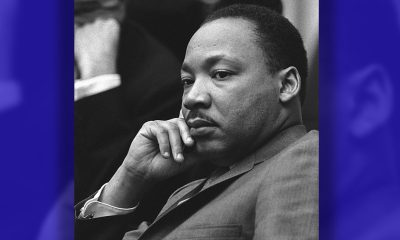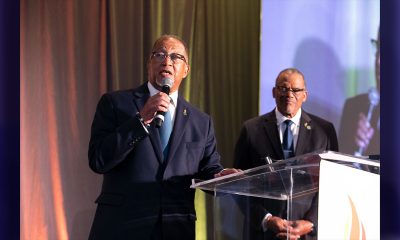Op-Ed
Neutralizing the Right Wing Political Agenda
By George E. Curry
NNPA Columnist
There’s a lesson to be learned from the Confederate flag quickly and unexpectedly falling into disfavor following the murder of nine Bible-studying African Americans, including the pastor, at Emanuel A.M.E. Church in Charleston, S.C. The lesson is that the economic clout of African Americans and their progressive allies can be used to pressure businesses to do the right thing, which in turn can keep the far right wing in check.
With every Southern governor’s mansion, Senate seat and 12 of the 13 Southern Statehouses controlled by Republicans (the Kentucky House is the lone exception), a corrosive sense of helplessness had begun to set in among some Blacks. After all, the majority of Blacks live in the South and once powerful Black Democratic state legislators have been politically neutered now that they are in the minority.
The tragedy in Charleston may have provided us with a blueprint for improving our predicament. First, it’s necessary to understand the role businesses played before and after Nikki Haley, the Republican governor of South Carolina, reversed her long-held position and advocated for the removal of the Confederate flag from the grounds of the state Capitol in Columbia.
According to the New York Times, “The chairman of the South Carolina Chamber of Commerce, an old friend of Ms. Haley’s named Mikee Johnson, polled his 56 board members about the future of the flag. Everyone who responded was of the same opinion. He called Ms. Haley and told her: If she was ready to bring down the Confederate banner, they were behind her.
“So was the South Carolina Manufacturers Alliance, the muscular association that represents giant international companies like BMW and Bridgestone Tire. Over the weekend after the shootings, its president, Mr. Gossett, urged members to draw up a strategy for finally ridding the State House of the flag.”
There were business reasons that motivated this change.
“They were tired of explaining why a symbol of the American Confederacy lingered at the capitol of a state that wanted to lure workers from all over the world,” the Times explained. “To many of them, it was a source of embarrassment that the N.C.A.A. would not pick South Carolina to host championship events because of the flag, and in the college-sports-crazy state, coaches said it was an obstacle to recruiting.”
To be clear, African Americans were at the forefront of this movement long before the business community belatedly flexed its muscles.
On July 15, 1999, the NAACP announced a boycott of South Carolina because it refused to remove the racially offensive flag from the Capitol. Five days later, Dr. Martin Luther King, Jr.’s old organization, the Southern Christian Leadership Conference (SCLC), voted to move its 2000 national convention from Charleston.
The group “Black Lives Matter,” which grew out of the movement to protest the death of African Americans who died at the hands of police, organized an online petition at Moveon.org, collecting signatures at a rate of 5,000 signatures per hour.
And social media, especially Black Twitter, was ablaze.
The floodgates were opened when Gov. Haley pronounced on June 22: “Today, we are here in a moment of unity in our state without ill will, to say it’s time to move the flag from the Capitol grounds. A hundred and fifty years after the end of the Civil War, the time has come.”
Within hours, a stampede of businesses, led by Walmart and Sears, announced they would no longer sell Confederate memorabilia. Other retailers fell in line, including Amazon, eBay, Target and Etsy.com.
This was old-fashioned capitalism at work. Why risk alienating a large base of consumers for the sake of a small segment of lunatics who not only wanted to turn back the clock, but wanted to turn back the calendar?
Leaders throughout the South got the massage.
Virginia Democratic Gov. Terry McAuliffe decided Virginia will no longer sell license plates that honor the Old Confederacy. Alabama Republican Gov. Robert Bentley ordered four different Confederate flags at the state Capitol be promptly removed. In Mississippi, House Speaker Philip Gunn, a Republican, called for changing the state flag, which incorporates the Confederate insignia.
With the business community weighing in along with the LBGT (Lesbian, Gay, Bisexual, and Transgender) advocates, we saw a similar retreat over religious freedom legislation in two states.
Indiana Gov. Mike Pence asked state legislators to “clarify” the Religious Freedom Restoration Act that he had already signed into law. In Arkansas, Gov. Asa Hutchinson threatened to veto similar legislation unless it, too, was “clarified” to say that it could not be used to discriminate against gays and lesbians.
In both the Confederate flag and religious freedom controversies, we have seen the clout of business leaders. Black spending power reached $1.1 trillion in 2014, according to the Selig Center for Economic Growth at the University of Georgia Terry College of Business. It’s time to exercise that clout by putting pressure on businesses, compelling them to apply pressure on Republican lawmakers who work against our interests.
George E. Curry, former editor-in-chief of Emerge magazine, is editor-in-chief of the National Newspaper Publishers Association News Service (NNPA) and BlackPressUSA.com. He is a keynote speaker, moderator, and media coach. Curry can be reached through his Web site, www.georgecurry.com. You can also follow him at www.twitter.com/currygeorgeand George E. Curry Fan Page on Facebook. See previous columns at http://www.georgecurry.com/columns.
###
Alameda County
Seth Curry Makes Impressive Debut with the Golden State Warriors
Seth looked comfortable in his new uniform, seamlessly fitting into the Warriors’ offensive and defensive system. He finished the night with an impressive 14 points, becoming one of the team’s top scorers for the game. Seth’s points came in a variety of ways – floaters, spot-up three-pointers, mid-range jumpers, and a handful of aggressive drives that kept the Oklahoma City Thunder defense on its heels.

By Y’Anad Burrell
Tuesday night was anything but ordinary for fans in San Francisco as Seth Curry made his highly anticipated debut as a new member of the Golden State Warriors. Seth didn’t disappoint, delivering a performance that not only showcased his scoring ability but also demonstrated his added value to the team.
At 35, the 12-year NBA veteran on Monday signed a contract to play with the Warriors for the rest of the season.
Seth looked comfortable in his new uniform, seamlessly fitting into the Warriors’ offensive and defensive system. He finished the night with an impressive 14 points, becoming one of the team’s top scorers for the game. Seth’s points came in a variety of ways – floaters, spot-up three-pointers, mid-range jumpers, and a handful of aggressive drives that kept the Oklahoma City Thunder defense on its heels.
One of the most memorable moments of the evening came before Seth even scored his first points. As he checked into the game, the Chase Center erupted into applause, with fans rising to their feet to give the newest Warrior a standing ovation.
The crowd’s reaction was a testament not only to Seth’s reputation as a sharpshooter but also to the excitement he brings to the Warriors. It was clear that fans quickly embraced Seth as one of their own, eager to see what he could bring to the team’s championship aspirations.
Warriors’ superstar Steph Curry – Seth’s brother – did not play due to an injury. One could only imagine what it would be like if the Curry brothers were on the court together. Magic in the making.
Seth’s debut proved to be a turning point for the Warriors. Not only did he contribute on the scoreboard, but he also brought a sense of confidence and composure to the floor.
While their loss last night, OKC 124 – GSW 112, Seth’s impact was a game-changer and there’s more yet to come. Beyond statistics, it was clear that Seth’s presence elevated the team’s performance, giving the Warriors a new force as they look to make a deep playoff run.
Activism
Essay: Intentional Self Care and Community Connections Can Improve Our Wellbeing
At the deepest and also most expansive level of reality, we are all part of the same being, our bodies made from the minerals of the earth, our spirits infused by the spiritual breath that animates the universe. Willingness to move more deeply into fear and pain is the first step toward moving into a larger consciousness. Willingness to move beyond the delusion of our separateness can show us new ways of working and living together.

By Dr. Lorraine Bonner, Special to California Black Media Partners
I went to a medical school that was steeped in the principles of classical Western medicine. However, I also learned mindfulness meditation during that time, which opened me to the multifaceted relationship between illnesses and the interconnecting environmental, mental and emotional realities that can impact an individual’s health.
Therefore, when I began to practice medicine, I also pursued training in hypnosis, relaxation techniques, meditation, and guided imagery, to bring a mind-body focus to my work in medical care and prevention.
The people I saw in my practice had a mix of problems, including high blood pressure, diabetes, and a variety of pain issues. I taught almost everyone relaxation breathing and made some general relaxation tapes. To anyone willing, I offered guided imagery.
“My work embraced an approach to wellness I call “Liberatory Health” — one that not only addresses the treatment and management of disease symptoms but also seeks to dismantle the conditions that make people sick in the first place.”
From my perspective, illness is only the outermost manifestation of our efforts to cope, often fueled by addictions such as sugar, tobacco, or alcohol, shackled by an individualistic cult belief that we have only ourselves to blame for our suffering.
At the deepest and also most expansive level of reality, we are all part of the same being, our bodies made from the minerals of the earth, our spirits infused by the spiritual breath that animates the universe. Willingness to move more deeply into fear and pain is the first step toward moving into a larger consciousness. Willingness to move beyond the delusion of our separateness can show us new ways of working and living together.
To put these ideas into practical form, I would quote the immortal Mr. Rogers: “Find the helpers.” There are already people in every community working for liberation. Some of them are running for office, others are giving food to those who need it. Some are volunteering in schools, libraries or hospitals. Some are studying liberation movements, or are working in urban or community gardens, or learning to practice restorative and transformative justice, or creating liberation art, music, dance, theater or writing. Some are mentoring high schoolers or apprenticing young people in a trade. There are many places where compassionate humans are finding other humans and working together for a better world.
A more compassionate world is possible, one in which we will all enjoy better health. Creating it will make us healthier, too.
In community, we are strong. Recognizing denial and overcoming the fragmenting effects of spiritual disorder offer us a path to liberation and true health.
Good health and well-being are the collective rights of all people!
About the Author
Dr. Lorraine Bonner is a retired physician. She is also a sculptor who works in clay, exploring issues of trust, trustworthiness and exploitation, as well as visions of a better world.
Activism
Opinion: Can Donald Trump Pole Dance?
Given all that is happening, if the presidency was more like pole dancing, you know Trump would be flat on his butt.

By Emil Guillermo
The news cycle has been buzzing the last few weeks. Xi, with Putin and Kim, the sweethearts of Trump carousing alone without him? The victims of the pedophile Epstein speaking out publicly in DC.
Then, there’s the release of that salacious letter Donald Trump allegedly wrote to Jeffrey Epstein. Trump said the letter didn’t exist. But it does.
Timing is everything.
Additionally, there are further concerns, such as the Supreme Court removing restrictions on ICE interactions. ICE Agents can stop anyone now. For any reason. And there’s the threat of the U.S. sending the military to fight crime in Chicago. Trump even posted a meme of himself as a character in “Apocalypse Now.”
All that with bad polls and bad economic numbers, and these topics are dominating the news cycle — Trump era chaos.
Given all that is happening, if the presidency was more like pole dancing, you know Trump would be flat on his butt.
The reality is the opposite. He keeps going strong like nothing’s happened. Inexplicably, Trump always seems to defy gravity.
That’s why to reassure myself with reality, I just think of Trump on a pole. Dancing. He was born on Flag Day, after all.
I’ve got pole dancing on my mind because I’m in Canada at the Vancouver Fringe Festival doing my show, “Emil Amok 69, Everything’s Flipped,” about how the current political situation gets very personal.
Get tickets here if you’re near:
I’ve performed at 16 fringe festivals, and I always look for unique performers. This year, in my same venue (the Revue Stage) I found her in a show, “The Pole Shebang.”
Andrea James Lui may look like a typical Asian American at first.
But she’s Asian Canadian, married to an Australian, who now lives down under.
At the Vancouver Fringe, she highlights her special identity.
Pole Dancer
Yes, pole dancing has come to the fringe. Leave your dollar bills at home, this is not that kind of pole dancing.
This is more Cirque Du Soleil-ish- acrobatic stuff, yet it’s hard to deny the sexiness when a woman flawlessly swings from a pole with her legs apart.
The show is more intriguing than it is titillating.
Lui has created a behind-the-scenes look at the “polar” experience.
“She could have been a physicist,” says her big sister Christina, who despite saying that, supports her sister 100 percent.
Lui touches on some of the emotional depth in the poled subculture. But there’s plenty more to mine in the future. “Polar Bare,” the Musical? I’d see it.
Trump on a Pole
So that’s how I’ve come to the polar metaphor.
As Trump flails in the news, I picture him on a pole.
The letter to Epstein is further proof of the character of the man.
Will he stay afloat?
Not if the presidency were more like pole dancing.
You can’t lie on the pole.
That’s one way all of us in the Trump era can get to the truth.
About the Author
Emil Amok is a veteran journalist, commentator, and stage monologist. He has written a weekly column on Asian Americans for more than 30 years.
Contact: www.amok.com
-

 Activism3 weeks ago
Activism3 weeks agoOakland Post: Week of November 12 – 18, 2025
-

 Activism3 weeks ago
Activism3 weeks agoIN MEMORIAM: William ‘Bill’ Patterson, 94
-

 Activism3 weeks ago
Activism3 weeks agoHow Charles R. Drew University Navigated More Than $20 Million in Fed Cuts – Still Prioritizing Students and Community Health
-

 Bay Area3 weeks ago
Bay Area3 weeks agoNo Justice in the Justice System
-

 #NNPA BlackPress3 weeks ago
#NNPA BlackPress3 weeks agoThe Perfumed Hand of Hypocrisy: Trump Hosted Former Terror Suspect While America Condemns a Muslim Mayor
-

 #NNPA BlackPress2 weeks ago
#NNPA BlackPress2 weeks agoTrump’s Death Threat Rhetoric Sends Nation into Crisis
-

 #NNPA BlackPress2 weeks ago
#NNPA BlackPress2 weeks agoLewis Hamilton set to start LAST in Saturday Night’s Las Vegas Grand Prix
-

 #NNPA BlackPress4 weeks ago
#NNPA BlackPress4 weeks agoProtecting Pedophiles: The GOP’s Warped Crusade Against Its Own Lies



























































